
Part 2 MARK STATMAN: MEXICO AND THE POETRY OF GRIEF AND CELEBRATION
Part 2 of my interview with Mark Statman looks closely at Mark’s Latin American poetic influences, his life in Mexico and ends with an extract
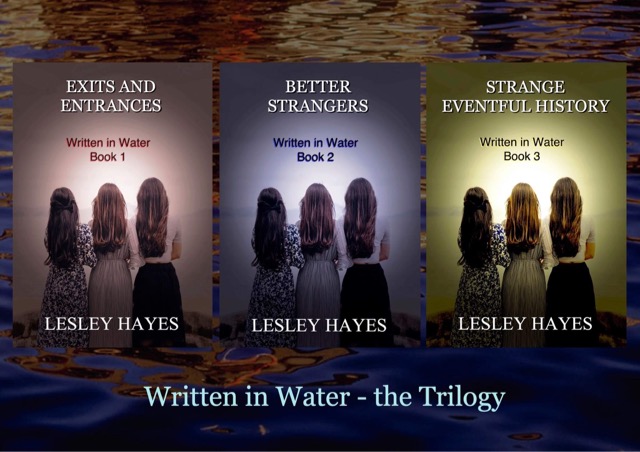
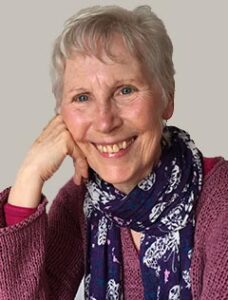
I interviewed author, philosopher and psychotherapist Lesley Hayes about the differences between the three stages in her creative life. Lesley abandoned a career as a best-selling writer to practise as a therapist, returning much later to writing books and, as a result, embracing a deeper sense of life.
Leslie: Can you describe the difference, please, between the books you wrote from 17 – 37 and those you’ve written after retirement. Why did you return to writing and how have you changed as an author?
Lesley: At 17 I began working on Honey Magazine, and showed the editor some of my short stories. She was so taken with one that she published it in the magazine. That was the start of a whirlwind rise to relative fame. It was the nineteen-sixties, a very different time, and the publishing world was not as it is now. I was headhunted by an agent at Laurence Pollinger (can you see that happening now?!) and soon all my stories were being published regularly in all the top magazines.
Those were the heady years when publishers took rising stars out to lunch and avidly devoured anything they were sent to read. I gained a sparkling reputation for my short stories but despite coming second in a prestigious competition into which my agent entered one of my unpublished novels, (the prize would have been a three-book deal), only one other of my novels was commissioned for publication. Paradoxically, it was about then that my family situation changed radically and I had to swiftly concentrate on developing a more lucrative career.Leslie: Why did you retrain as a psychotherapist in between writing careers, and what have you learned about yourself from being one?
Lesley: It wasn’t so much the money I was likely to earn as a clarion call from my soul that made me choose to train as a psychotherapist. From a very early age I had developed a knack for seeing into the core of emotional issues in relationships – a gift that had enabled me to write insightfully. Now I discovered that same skill was vital for psychotherapy. The training was long, challenging, and arduous, but it left no stone unturned, especially when it came to exploring the dark shadow side of my own personality. As any therapist worth their salt will tell you, that is a prerequisite for understanding other people as deeply as you need to. First you must know yourself inside out, and see what runs you, what blocks you, and what inspires you. I had always been a spiritual rather than a religious person, without finding anywhere to hang my hat. But luckily one of my tutors during the training was a Zen Buddhist, who wisely pointed me in the direction of Thich Nhat Hahn’s teachings, which resonated with my own ideas of how to be in the world. That introduced me to meditation and I developed a practice that sat alongside my work as a therapist as well as enhancing my daily experience. I also ‘met’ through books numerous writers like Jack Kornfield, Stephen Levine, Ram Dass, and Irvin D.Yalom, who educated me in the ways of the heart so much more than any academic teaching. I was so privileged to engage in the kind of deep experiential work that I’ve seen lacking in many other psychotherapy schools, and I can honestly say that the years of training changed me in ways that have continued to reverberate. I learned what it truly meant to be compassionate, to allow my natural empathy to flow into every part of my life. I loved the work, and came to realise how relatively shallow my writing had been when I was younger. The stories had been clever and perceptive, but sometimes slightly cruel, as I worked through my own unconscious issues. I have never once regretted the years devoted to my career as a therapist, and I have the satisfaction of knowing that I helped some people climb out of the dark despair I too had known in my life.
Leslie: When you write what are your habits/quirks/rituals/working methods? How do you subjectively experience the writing process?
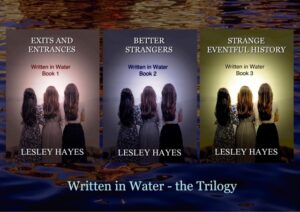 Lesley: I have an ideal working scenario which I don’t always follow, since there are times when life gets in the way. But on a good day I will devote several hours in the morning to whatever happens to be my work in progress, usually editing what I’ve written the day before, and feeling my way back into the story and the characters. I immerse myself deeply in the characters, and have to somehow become them in order to write their script authentically. When I have a number of very different prime protagonists, as I did with the trilogy Written in Water, it is a mammoth task. I find myself waylaid by each of them at different times of the day and night, speaking from their perspective, occasionally vying for my attention. It takes a while after completing a book to completely let them go. They are all aspects of my own personality, of course – a fact which sometimes pulls me up short when I am thinking of the less pleasant ones. They are definitely inhabitants of my shadow. I find writing can be torturous at times, blissful at others. I can struggle for an hour over the right word or phrase, or find my fingers flying across the keyboard trying to keep up with the rapidity of my mental flow. I can stop halfway through a meal, or on the verge of sleep, and have to get up and write down the key word that has just come to me. Occasionally the key word turns out to be several paragraphs. There is a sense of huge relief at having committed it to paper. I am temporarily off the hook. The muse is a hard taskmaster. She (or perhaps weirdly ‘he’, as I discovered in one of my meditations,) has been with me for as long as I can remember.
Lesley: I have an ideal working scenario which I don’t always follow, since there are times when life gets in the way. But on a good day I will devote several hours in the morning to whatever happens to be my work in progress, usually editing what I’ve written the day before, and feeling my way back into the story and the characters. I immerse myself deeply in the characters, and have to somehow become them in order to write their script authentically. When I have a number of very different prime protagonists, as I did with the trilogy Written in Water, it is a mammoth task. I find myself waylaid by each of them at different times of the day and night, speaking from their perspective, occasionally vying for my attention. It takes a while after completing a book to completely let them go. They are all aspects of my own personality, of course – a fact which sometimes pulls me up short when I am thinking of the less pleasant ones. They are definitely inhabitants of my shadow. I find writing can be torturous at times, blissful at others. I can struggle for an hour over the right word or phrase, or find my fingers flying across the keyboard trying to keep up with the rapidity of my mental flow. I can stop halfway through a meal, or on the verge of sleep, and have to get up and write down the key word that has just come to me. Occasionally the key word turns out to be several paragraphs. There is a sense of huge relief at having committed it to paper. I am temporarily off the hook. The muse is a hard taskmaster. She (or perhaps weirdly ‘he’, as I discovered in one of my meditations,) has been with me for as long as I can remember.
Leslie: Can you give examples of how your mental health has helped and hindered you as a writer and as an enquiring & compassionate human being, please?
Lesley: As a child and a much younger woman I suffered various traumas that left a dark calling card inside me, and it took extensive therapy to completely free myself from the occasional slips down into the rabbit hole. Back in the day mental health was something whispered about and judged as weakness rather than the strength that fully owning one’s vulnerability can turn out to be, and thankfully that attitude has substantially changed. I’m glad to have been part of the vanguard of therapists who helped make that happen.
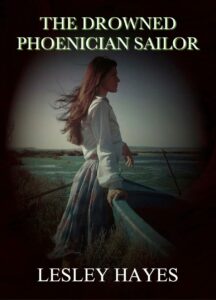 Fast-forward then to post retirement, when the writer in me itched to express herself again. It wasn’t so surprising that the first book I wrote at that point was The Drowned Phoenician Sailor, which features among other characters a dead psychotherapist who haunts his client.
Fast-forward then to post retirement, when the writer in me itched to express herself again. It wasn’t so surprising that the first book I wrote at that point was The Drowned Phoenician Sailor, which features among other characters a dead psychotherapist who haunts his client.
Leslie: Can you expand on this quote from your website, please: ‘The notion of truth in some form or another keeps appearing – not surprisingly since it has been such an issue for me throughout my life’.
Lesley: We have all been haunted one way or another by things that remain unresolved in our life, and to explain this quote I need to refer again to my troubled childhood, where my earliest experiences were confusing and unreliable to say the least. In subsequent years I found it important to act with honesty and tell the truth as I saw it, in order never to confuse other people as I had been confused. I married young, twice, and was each time at the receiving end of ‘more of the same’ as so often happens in our earliest attempts at intimate relationship – by which I mean I found myself in doomed relationships where truth and trust were trashed. It was a steep learning curve in which I eventually came to understand the old saying: ‘Trust in God but tie up your camel’. For me that has meant keeping my heart open but with the awareness that we are all human and liable to break trust and fall short of our best intentions. It’s best not to have too high expectations of other people, although I still have rather too high expectations of myself.
Leslie: How does writing nurture spiritual growth? What are the limitations of words on paper and ‘one voice tells all’?
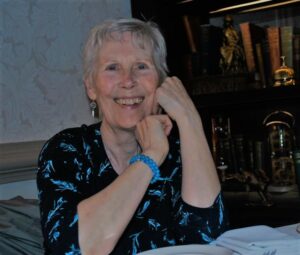
Lesley: Writing has always been my preferred method of self-expression, and looking back I can see that as a child it was a valve to release some of the emotional pain I experienced, and a ready companion who would always listen to what I had to say. Over the years, from the age of 14, I kept a journal – the early entries all written in spiral bound notebooks that one day perhaps my children or grandchildren might read with astonishment. In about the year 2000 I began writing my journal on the computer, and there is an enormous backlog of it now. During the years I was working as a therapist it was especially useful as a place to offload my personal feelings and experiences. Occasionally now I read through some of those records of time long past and discover how often patterns repeated themselves and then how eventually I found my way through the fog of unawareness. We always have a few blind spots, however hard we work on ourselves. I have often suggested to clients that they keep a journal, because it can be the most honest voice we use to speak to ourselves, and a way of discovering the hidden truth of what we feel. It can be a pointer towards what we need to do to make a change in our life, and a refuge when it seems no one else in the world will listen. It can never tell the whole truth of course – those blind spots I mentioned – but it can be a reflective mirror of things we need to see, however obscurely. Similarly, in my novels and short stories I like to hold up a mirror, and aim to work with a light brush on the canvas, allowing my readers to draw their own conclusions about a character. The perspective can usefully shift with a number of different protagonists when writing in the third person, although it can be immensely liberating and powerful to narrate entirely from the first person perspective – as I found with The Drowned Phoenician Sailor. But characters are nothing without a story, and the most exacting task of all as a writer is to find a plot that fascinates you as much as anyone who reads it. Fortunately my mind has never stopped spinning webs of curiosity and imagination.
Next week I interview artist Isobel Moore, who uses the domestic sewing machine to recycle colourful fabrics, old lace, beads, buttons, maps and music.
ABOUT LESLIE TATE’S BOOKS:

Part 2 of my interview with Mark Statman looks closely at Mark’s Latin American poetic influences, his life in Mexico and ends with an extract

I interviewed international poet and translator Mark Statman about Volverse/Volver, his 14th published collection. Mark, who has won national arts awards, is Emeritus Professor of Literary

I interviewed Lisa Dart, finalist in the Grolier, Aesthetica and Troubadour Poetry Prizes and author of The Linguistics of Light (poems, Salt, 2008), Fathom (prose

I interviewed writer Julia Lee Barclay-Morton about her experience of autism. Julia began as an experimental dramatist in New York, moving to the UK to

I interviewed Gillean McDougall from Glasgow, who edited the collaborative projects Honest Error (on Charles Rennie Mackintosh and his wife Margaret Macdonald) and Writing the
| Cookie | Duration | Description |
|---|---|---|
| cookielawinfo-checkbox-analytics | 11 months | This cookie is set by GDPR Cookie Consent plugin. The cookie is used to store the user consent for the cookies in the category "Analytics". |
| cookielawinfo-checkbox-functional | 11 months | The cookie is set by GDPR cookie consent to record the user consent for the cookies in the category "Functional". |
| cookielawinfo-checkbox-necessary | 11 months | This cookie is set by GDPR Cookie Consent plugin. The cookies is used to store the user consent for the cookies in the category "Necessary". |
| cookielawinfo-checkbox-others | 11 months | This cookie is set by GDPR Cookie Consent plugin. The cookie is used to store the user consent for the cookies in the category "Other. |
| cookielawinfo-checkbox-performance | 11 months | This cookie is set by GDPR Cookie Consent plugin. The cookie is used to store the user consent for the cookies in the category "Performance". |
| viewed_cookie_policy | 11 months | The cookie is set by the GDPR Cookie Consent plugin and is used to store whether or not user has consented to the use of cookies. It does not store any personal data. |
11 responses
Fabulous . I enjoyed reading all of that!
Thank you, Patricia. They were great questions… made me think carefully about my replies.
As an avid fan of Leslie Hayes’ writing, it was good to see such a fascinating insight into the person behind the stories. For anyone who reads her work, it should come as no surprise that her professional background was in ‘matters of the mind’.
Honesty and openness with others is great, but as shines through in Leslie’s responses, honesty with yourself is challenging but worthwhile.
A great interview.
Thank you, Tom. I feel touched by your response. And I so appreciate how much you enjoy my books. When I’m sitting at my desk writing, readers like you are my imagined audience, and it gives me a huge incentive to continue.
A great interview – and different from mos I have seen. Loved the before and after! Please never stop spinning webs of curiosity and imagination!
Thank you Sharon. I loved the questions Leslie posed. I agree, it’s different from many other interviews, and got right to the heart of who I am and what inspires me as a human being as well as a writer.
A lovely interview, Lesley.
Thank you, Ruth. It was a pleasure to do it.
I shall come back and read this again, so much of it resonates with me.
I thought I knew you, Lesley, and, to s degree, I did. It goes without saying I love your books. 🙂
There’s always something new to learn about someone, Sarah! I think readers can get a keen sense of who I am through reading my books, and I know how much you relate to them. I haven’t had an interview that asked such searching questions before, and I tried not to shy away from answering them honestly.
It’s one of the most probing and unusual interviews I’ve ever read. I can imagine you giving your answers a lot of thought.